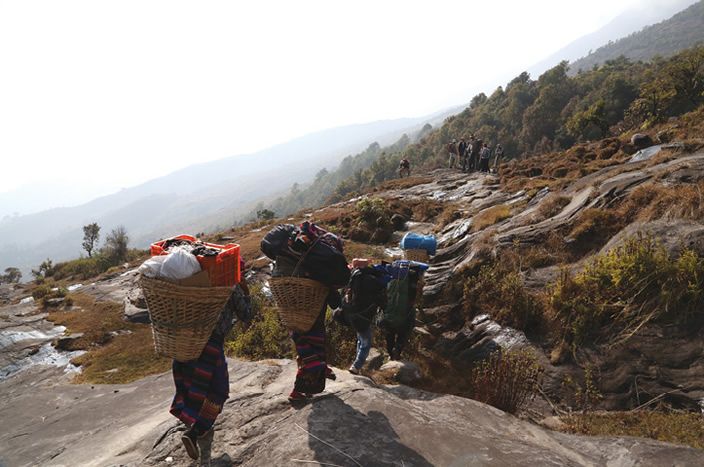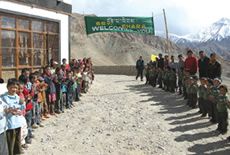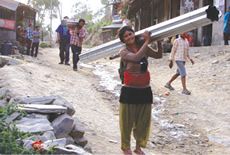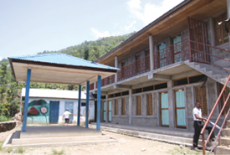
The earthquakes on 25 April and 12 May killed 8,693 people and injured 22,221 others. Earthquakes registered 7.8 and 7.3 magnitude and it’s estimated that more than 90% of schools were destroyed in the worst-hit districts of Gorkha, Sindhupalchok, Nuwakot and Rasuwa District. After the first earthquake, 13 districts were declared ‘priority affected districts’.
UNICEF claims approximately 32,000 classrooms were destroyed and 15,352 classrooms were damaged after the earthquakes. Schools across the districts worst hit by two major earthquakes in Nepal reopened recently. The Education Ministry ordered that classes be held in temporary classrooms as most school buildings were damaged and many unsafe.
Delivering directly to Nepal
Cranbrook School in Bellevue Hill, through Cranbrook Explorers and Travellers Overseas Partnership (CETOP), jumped into action within 24 hours of the initial quake. With the support of Headmaster Nicholas Sampson, CETOP called on the wider school community to ‘dig deep’ and help through donations. It was for the people of Nepal they knew well after working on community-based projects in the region for the past decade. Within six weeks CETOP raised $90,000 to help the people of earthquake ravaged Nepal. Contributions are still flowing in; two other schools contributed to the CETOP earthquake appeal, Oxley College, Bowral and Ascham School, Edgecliff.
On 19 May, Cranbrook Housemaster and geography teacher Robert Lock was interviewed by Peter Switzer on Sky News Business about the extraordinary support CETOP has given Nepal. Their discussion focused on the earthquake appeal where Robert Lock could say that every dollar given to CETOP goes directly to help the people in Rasuwa, one the worst affected areas.
“CETOP has been committed to projects in northern India and Nepal for the last 10 years. Work in these areas needs consistency and continuity to be effective; commitment must be long term. So when a tragic disaster of this magnitude occurs, CETOP’s longstanding connections with communities made it possible to respond and deliver appropriately and successfully.”
CETOP was originally a teacher initiative, which aimed at extending classroom learning and help develop social awareness through direct involvement in fundraising, trekking and community projects. By taking students into ‘the field’, CETOP has given Cranbrook students a direct and invaluable experience with communities abroad.
Robert Lock told Newsmonth that the most recent generosity and support from Cranbrook’s students, teachers and parents was built on personal experience and commitment. Support for CETOP projects begins early in the Junior School, boys from Year 6 to Year 12 travel to CETOP projects in India and Nepal where boys and their parents become supporters of the projects.
“The boys travel with Cranbrook staff and World Horizons to trek and help with the various projects, most notably in the two schools CETOP has built in Nepal the Jeremy Madin/Kalchitt Primary School in the Rasuwa District and in Ladakh, the Shara Nursery School. Parents are invited to join treks to assist and enrich understanding and support for CETOP endeavours.
“Cranbrook teachers make their own commitment where biannually a group of teachers travel to Ladakh to run professional development and training for teachers. Our Cranbrook teachers pay for their own trips and give of their time and professional expertise.”
The primary school in Kalchitt was built by local people, but the building process was overseen and carefully monitored by architect and CETOP President Renate Carius. It was built in consultation with local people in a location accessible to children from surrounding villages. This region was recognised to be in an earthquake belt so the school was constructed to survive severe tremors and quakes.
While in the recent earthquakes villages throughout the region were devastated and the valley torn apart, the Jeremy Madin/Kalchitt Primary School remained structurally sound with only minor cracking of non-structural walls.
Since the earthquake, CETOP President, World Horizons representatives and an experienced ICU nurse travelled to Nepal to directly deliver the proceeds of donations. They distributed bundles of corrugated iron sheeting to villagers for immediate temporary shelter prior to the monsoon rains. The villagers will be able to recycle the materials to rebuild their houses.
CETOP’s contribution to the Roofs for Rasuwa project has provided shelter for approximately 5,500 people. Together with three other small group providers, the project has given shelter for an estimated 11,500 people.
Since the April earthquake, CETOP has received hundreds of kilos of medical supplies that are now being delivered to the Rasuwa District. The supplies are greatly appreciated at the Chitti and Jhib Jhibe medical outposts, where medical resources are limited to non-existent. There is little to no other medical support, no equipment and no specialists; the work of doctors and nurses there remains very difficult.
IEU Rep David Berridge said, “As a member of Cranbook’s Chapter, staff are fully supportive of the school’s efforts in raising money for CETOP projects including building schools and providing infrastructure in Ladakh and Nepal. It’s a heartfelt and long term commitment for many of us.”










































































































































